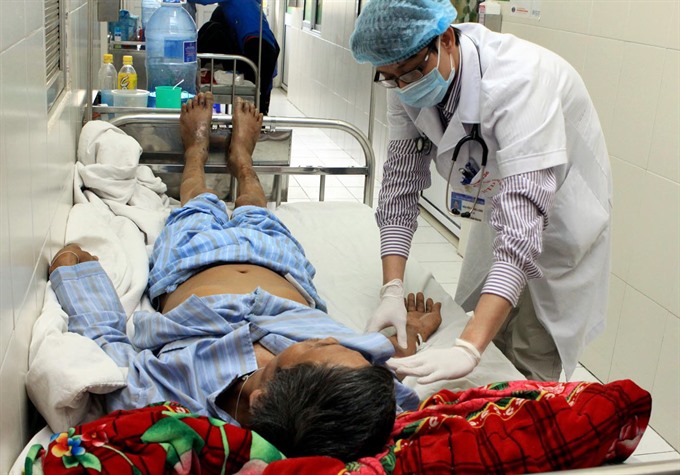 Society
Society

The Department of Preventive Medicine under the Ministry of Health has issued a warning concerning Streptococcus suis infection.
 |
| A patient infected with Streptococcus suis receives treatment at the National Centre for Tropical Diseases. — VNA/VNS Photo Dương Ngọc |
HÀ NỘI — The Department of Preventive Medicine under the Ministry of Health has issued a warning concerning Streptococcus suis infection.
Statistics from the department showed that some 171 cases of Streptococcus suis (a kind of bacteria from pigs) were reported throughout the country last year, including 14 deaths. These cases are rampant during Tết (Lunar New Year) holiday.
A study on these cases pointed out that seven out of 10 people infected with the bacteria ate raw pork or pork products, such as tiết canh (blood pudding).
The National Institute of Hygiene and Epidemiology also cited the same reason, saying that most cases involved patients dealing with the slaughter of pigs and consuming raw pork.
The disease occurs throughout the year in Việt Nam. However, it tends to increase during the year-end when people celebrate the Lunar New Year. During this holiday, many families slaughter pigs and eat blood pudding with the hope that it will bring luck to them.
According to the department, once people are infected with Streptococcus suis, the disease develops quickly, causing septic shock, coma and multiple organ failure. Patients have symptoms such as high fever, nausea, vomiting and it is often mistaken for digestive disorder.
In severe cases, Streptococcus suis infection can manifest itself into meningitis, toxic shock and septicemia.
A Streptococcus suis infection can be cured with antibiotics but it requires long-term treatment.
A patient with Streptococcus suis meningitis might be hospitalised for at least three weeks. The infection can prove fatal if patients receive treatment too late.
To prevent the disease, the Ministry of Health has advised people not to eat blood pudding or raw pork.
Residents were also advised to cook pork meat properly to eliminate the risk of infection, as no vaccination against the disease is available at the moment.
They should avoid purchase, transport or slaughter of pigs that are sick or dead, and practise personal hygiene by using protective gloves when in contact with pigs. — VNS




